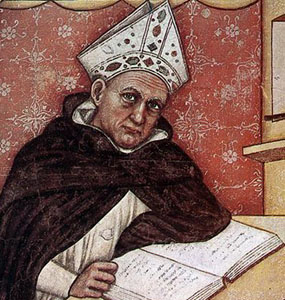 St Albert the Great reminds us that there is
St Albert the Great reminds us that there is
friendship between science and faith and that through their vocation to the
study of nature, scientists can take an authentic and fascinating path of
holiness.
His extraordinary openmindedness is also revealed in a cultural feat
which he carried out successfully, that is, the acceptance and appreciation of
Aristotle’s thought. In St Albert’s time, in fact, knowledge was spreading of
numerous works by this great Greek philosopher, who lived a quarter of a
century before Christ, especially in the sphere of ethics and metaphysics. They
showed the power of reason, explained lucidly and clearly the meaning and
structure of reality, its intelligibility and the value and purpose of human
actions. St Albert the Great opened the door to the complete acceptance in
medieval philosophy and theology of Aristotle’s philosophy, which was
subsequently given a definitive form by St Thomas. This reception of a pagan
pre-Christian philosophy, let us say, was an authentic cultural revolution in
that epoch. Yet many Christian thinkers feared Aristotle’s philosophy, a
non-Christian philosophy, especially because, presented by his Arab
commentators, it had been interpreted in such a way, at least in certain
points, as to appear completely irreconcilable with the Christian faith. Hence
a dilemma arose: are faith and reason in conflict with each other or not?
which he carried out successfully, that is, the acceptance and appreciation of
Aristotle’s thought. In St Albert’s time, in fact, knowledge was spreading of
numerous works by this great Greek philosopher, who lived a quarter of a
century before Christ, especially in the sphere of ethics and metaphysics. They
showed the power of reason, explained lucidly and clearly the meaning and
structure of reality, its intelligibility and the value and purpose of human
actions. St Albert the Great opened the door to the complete acceptance in
medieval philosophy and theology of Aristotle’s philosophy, which was
subsequently given a definitive form by St Thomas. This reception of a pagan
pre-Christian philosophy, let us say, was an authentic cultural revolution in
that epoch. Yet many Christian thinkers feared Aristotle’s philosophy, a
non-Christian philosophy, especially because, presented by his Arab
commentators, it had been interpreted in such a way, at least in certain
points, as to appear completely irreconcilable with the Christian faith. Hence
a dilemma arose: are faith and reason in conflict with each other or not?
This
is one of the great merits of St Albert: with scientific rigour he studied
Aristotle’s works, convinced that all that is truly rational is compatible with
the faith revealed in the Sacred Scriptures. In other words, St Albert the
Great thus contributed to the formation of an autonomous philosophy, distinct
from theology and united with it only by the unity of the truth. So it was that
in the 13th century a clear distinction came into being between these two
branches of knowledge, philosophy and theology, which, in conversing with each
other, cooperate harmoniously in the discovery of the authentic vocation of
man, thirsting for truth and happiness: and it is above all theology, that St
Albert defined as “emotional knowledge”, which points out to human
beings their vocation to eternal joy, a joy that flows from full adherence to
the truth.
is one of the great merits of St Albert: with scientific rigour he studied
Aristotle’s works, convinced that all that is truly rational is compatible with
the faith revealed in the Sacred Scriptures. In other words, St Albert the
Great thus contributed to the formation of an autonomous philosophy, distinct
from theology and united with it only by the unity of the truth. So it was that
in the 13th century a clear distinction came into being between these two
branches of knowledge, philosophy and theology, which, in conversing with each
other, cooperate harmoniously in the discovery of the authentic vocation of
man, thirsting for truth and happiness: and it is above all theology, that St
Albert defined as “emotional knowledge”, which points out to human
beings their vocation to eternal joy, a joy that flows from full adherence to
the truth.
Pope Benedict XVI
March 2010